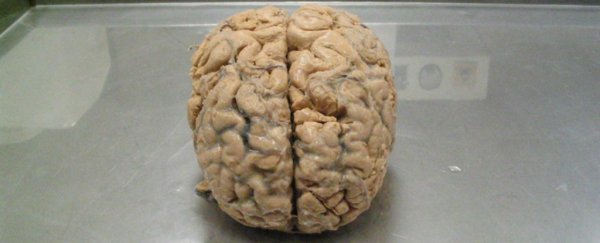Most days, it's a struggle just to remember where you put your keys. But there are a few 'super-memorisers' in the population who can memorise huge lists of words at a time, or recite thousands of digits of Pi by heart.
Now, new research suggests that these super-memorisers aren't all that different to us, and that even average human brains can be taught the same skills with just a little over a month's training.
In fact, the brain of a person with average memory skills isn't structurally any different to the brain of a super memoriser, according to the new study, which means there's hope for all of us to boost our memory abilities.
To figure this out, researchers from Radboud University Medical Centre in the Netherlands studied the brains of the 23 top competitors in the World Memory Championships - a competition where contestants try to recall more words off a list than the person next to them.
Oddly enough, the researchers found that the brain anatomy of these super-memorisers was nothing special compared to the average brains of 23 people of similar ages, health, and intelligence. But the World Memory Championship brains did show specific changes in brain connectivity - in other words, regions in their brains work together in different ways.
Because brain connectivity is known to be flexible, the team then tested whether average memorisers could be trained to significantly improve their memories.
After training 51 'normal memorisers' for 30-minutes a day over 40 days, the team found that one technique in particular saw participants' memory capacity more than double - going from recalling an average of 26 words from a list of 72, to an impressive 62.
Even more fascinating, their brain connectivity patterns were more similar to the World Memory Championships athletes than before. And four months after the experiment and brain training exercises, their recall performance remained high.
"After training we see massively increased performance on memory tests," said lead researcher, neuroscientist Martin Dresler.
"Not only can you induce a behavioural change, the training also induces similar brain connectivity patterns as those seen in memory athletes."
This is a small sample size, so we can't get too excited by their brain training routine just yet - and there's no evidence that in a larger group this memory-training technique would be as effective, or that these changes in connectivity are exclusively linked to memory ability.
But this is one of the first studies to investigate the unique brain structure of these top performing super-memorisers, and it's an interesting place to start.
And it actually makes sense that the brains of super-memorisers aren't unique, because none of them were born with exceptional memory skills - they were all trained, says Dresler.
"They, without a single exception, trained for months and years using mnemonic strategies to achieve these high levels of performance," he explains.
Based on this information, the team set up a second experiment to see if regular people could be taught the same skill. They recruited 51 individuals that belonged to a similar demographic as the super memorisers, but didn't have any exceptional memory skills or previous memory training.
These 51 volunteers were split into three groups - two groups that underwent brain training, and one that didn't. The participants underwent brain scans both before and after training.
The two training methods were short-term memory training - where an individual practices remembering sequences, sort of like playing a game of Concentration - and strategic memory training, which is where people are given a systematic way to remember lists.
In this case, the strategic memory training participants were given was 'loci training', which you can try for yourself here. It involves participants associating items on a list with a remembered place, and then navigating that space in their minds in order to recall the list.
Out of the three groups, the strategic memory training was the most successful.
Before the study, individuals could remember an average of between 26 and 30 words. But after 40 days of 30-minutes training a day, the strategic memory group could recall on average 35 more words.
Those who underwent short-term memory training could recall 11 more words, and those in the control group who underwent no training recalled seven more words than they could at the start.
Four months later, the strategic memory group was the only one to keep up the gains without any additional training - still recalling 22 more words than they did before they'd learnt the strategy.
Not only that, but after training, the brain connectivity of the strategic training group had changed.
Notably, those changes seemed to centre around two brain regions - the medial prefrontal cortex, which is known to be active when individuals relate new knowledge to pre-existing knowledge. And the right dorsal lateral prefrontal cortex, which is involved in efforts to learn strategically.
"It makes sense that these connections would be affected," said Dresler. "These are exactly the things we ask subjects to do when using method of loci for memorisation."
It's important to note that this is an early-stage study with a small sample size. Researchers are only just beginning to understand how our brains remember at all, so it's unlikely that we've cracked how to drastically improve that memory capacity with one paper.
Further research is now needed to get a better idea how strategic memory training can change the brain's connectivity, and whether this training system works on a broader sample size.
But it's an interesting starting point, and isn't too dissimilar to research into Einstein's brain, which has failed to uncover some unique physical structure or size difference that might explain his brilliance.
It's always nice to think that most of us are born with the same brain structure as geniuses, we just need to learn how to tap into our potential.
The research has been published in Neuron.
